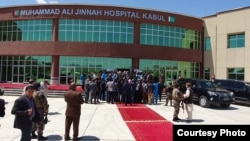Afghanistan and Pakistan have jointly inaugurated a 200-bed, state-of-the-art hospital in Kabul, one of three major health care facilities being built and funded by Islamabad as its contribution to reconstruction efforts in the war-ravaged neighboring country.
Named after the founder of Pakistan, the Muhammad Ali Jinnah Hospital took 12 years to finish at a cost of more than $24 million. Officials in both countries cited deteriorating Afghan security, continued mutual political acrimony and institutional as well as bureaucratic inefficiencies for the delay in the completion of the second-largest hospital in Afghanistan.
Vice President Mohammad Sarwar Danish, Afghan Health Minister Ferozuddin Feroz, and a visiting senior-level Pakistani delegation headed by Cabinet Minister Ali Muhammad Khan attended the inaugural ceremony Saturday where Pakistan officially handed over the multispecialty facility to the Kabul government.
"It opens a new chapter in the friendship of the two countries. … This is the second-largest hospital [in Afghanistan] built with your support that will serve the needy," Feroz told the gathering. He added that a second Pakistan-funded, 100-bed hospital costing $19 million and a major kidney center were near completion and would be inaugurated soon in the eastern Afghan cities of Logar and Jalalabad, respectively.
Polio fight
The Afghan minister also emphasized the need for the two countries to enhance cooperation in fighting the wild polio virus. The United Nations says Afghanistan and Pakistan are the only two countries in the world where the disease is still crippling children.
Visiting Minister Khan noted in his speech that Pakistan has pledged an overall $1 billion in development assistance to Kabul "in pursuance of Pakistan's policy objective of deepening and broadening people-to-people connections between the two countries." He said the newly built hospital would "contribute immensely" to improving the Afghan health sector, noting the completion of three hospitals and 14 mobile medical units would conclude Pakistan's assistance to Afghanistan in the health sector.
Pakistani officials say they are also working to enhance capacity and manpower at their diplomatic missions and major border crossings with Afghanistan to speed up issuing visas and make it faster to enter the country to help Afghans seeking medical treatment in Pakistani hospitals.
Bilateral relations remain fragile and tense over Afghan allegations that Islamabad covertly supports and shelters leaders of the Taliban insurgency, while Pakistan officials allege anti-state militants are using volatile border areas in the neighboring country to plot terrorist attacks inside Pakistan.
U.S.-Taliban talks
Pakistan takes credit for arranging an ongoing direct dialogue between the Taliban and the United States to help end the 18-year-old war in Afghanistan. The months-long U.S.-Taliban talks are the first serious engagement between the two adversaries, raising expectations it could lead to an intra-Afghan peace dialogue to end years of hostilities.
But Afghans remain skeptical about Islamabad's intentions and insist the neighboring country is trying to help the Taliban regain power in Kabul to continue its alleged meddling in Afghanistan's internal affairs.
Pakistan, which still hosts about 3 million Afghan refugees, rejects the allegations as unfounded and politically motivated.
The two countries share a 2,600-kilometer border, and tens of thousands of people move daily in both directions. Islamabad says a robust fence being built on the traditionally porous Afghan border is expected to be completed by end of this year and that it would help deter illegal cross-border movements and address mutual security concerns.





